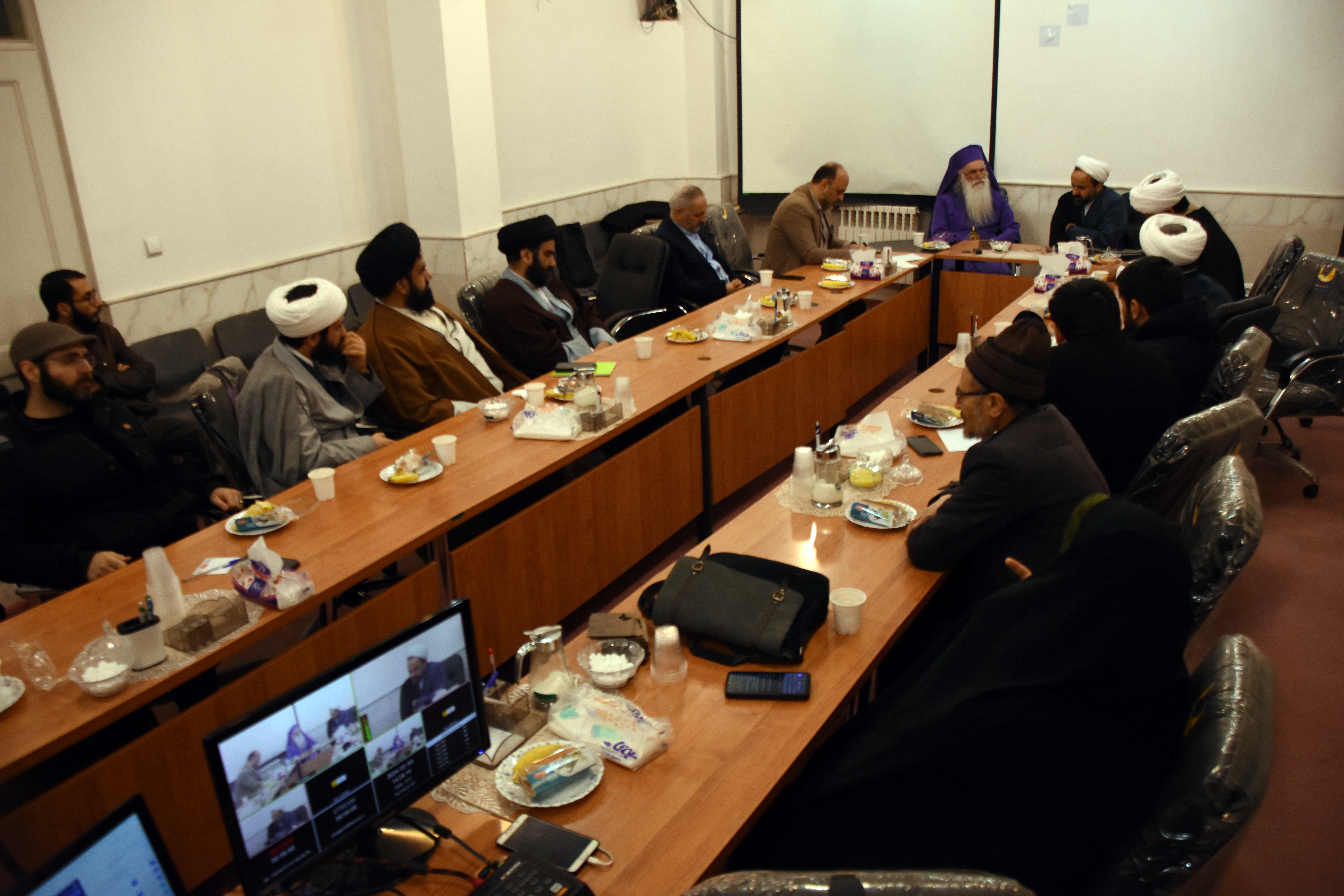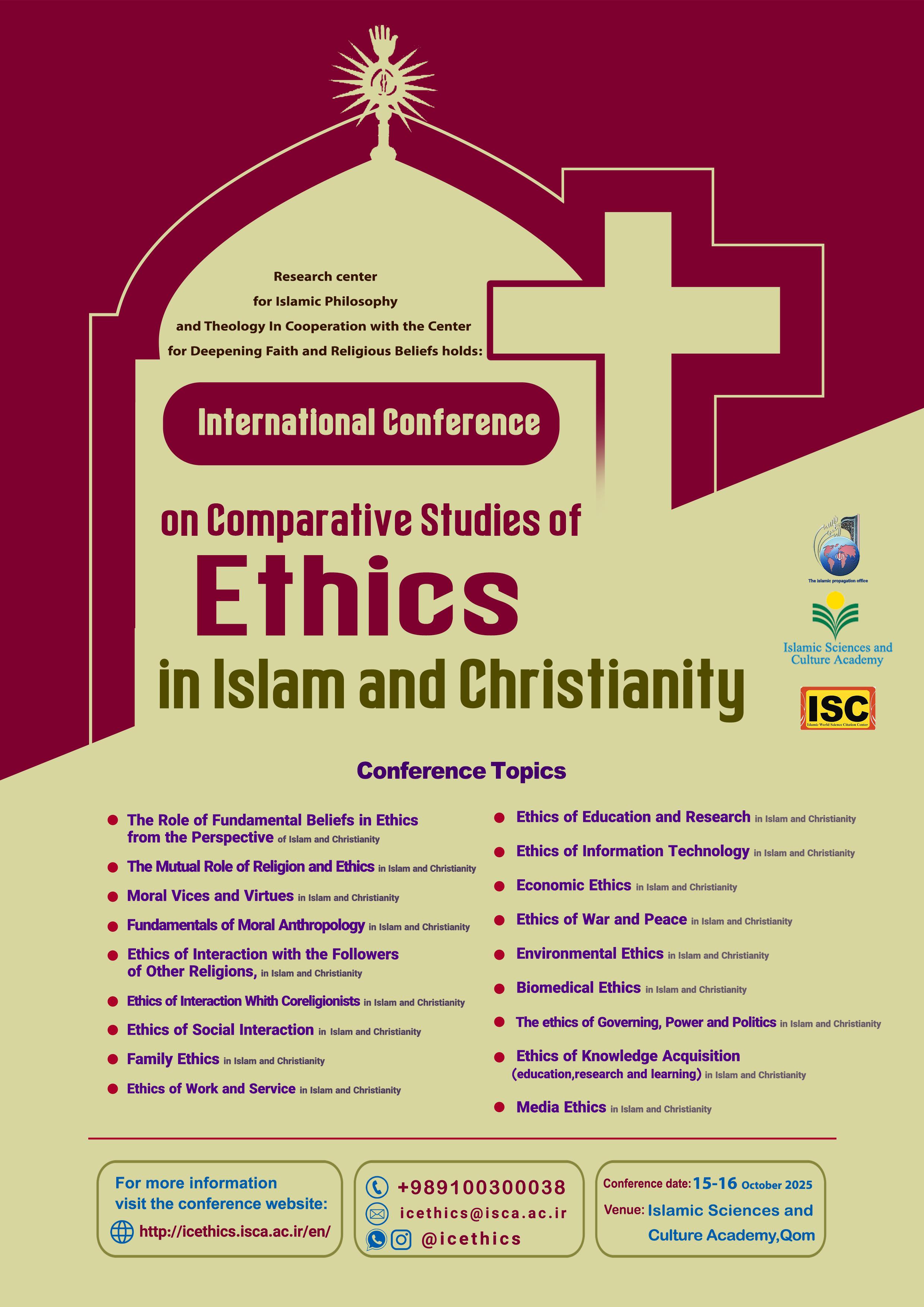The Eleventh Session on The Ethics of Helping and Serving in Islam and Christianity

Research center for Islamic Philosophy and Theology in Cooperation with the Center for Deepening Faith and Religious Beliefs held the eleventh session on the followoing topic:
The Ethics of Helping and Serving in Islam and Christianity
Malkhaz Songulashvili
Baptist Archbishop of Georgia
Dr. Habibollah Babaei
Director of Research Center for Civilizational and Social Studies
Date: February 3, 2024
Time: 9 (Tehran)
Venue: Khatam al-Nabi’een Higher Institute, No. 21, Alley 37, Safa’iyeh St., Qom, Iran
At the beginning of the session, Hujjat al-Islam Sahaf Kashani introduced the speakers. He mentioned that Mr. Malkhaz Songulashvili is the Archbishop of the Georgian Baptist Protestant Church and a senior professor at Ilia University in Georgia, specializing in Comparative Theology. Hujjat al-Islam Dr. Habibullah Babaei is the head of the Institute of Civilizational and Social Studies at the Research Institute of Islamic Sciences and Culture. Dr. Kashani then invited Archbishop Malkhaz to present his discussion on the conference topic.
The honorable Archbishop began by thanking the Islamic-Christian Dialogue Association of the seminary and Mr. Kashani, as well as acknowledging the efforts of Mr. Maqdasi. He stated that as a religious figure and a professor of theological studies at the university, he believes that in the field of social issues and social work, we should highlight our commonalities. Muslims and Christians together comprise more than fifty percent of the world's population, and cooperation between these two major Abrahamic religions will certainly have positive global impacts. He then mentioned that he belongs to a small Baptist church in Georgia, which itself is a small country. In the teachings of our church and Christian teachings, being involved in social work and social services is considered a very important teaching. In this regard, there are three main axes in Christian teachings, which are as follows:
-
Koinonia: This teaching, equivalent to the concept of Ummah in Islamic culture, has existed as an old concept of the Christian community for centuries. Even today, we believe that this concept is not exclusive to the Christian community but includes the entire community of believers worldwide, who can be followers of all religions. Based on this, we believe that the community of believers should seek convergence and set aside differences. The convergence of the community of believers (koinonia) can only be formed with the motivation of pleasing God. I must confess here that the Christian tradition in the past was based on proselytizing and inviting followers of other religions to convert to Christianity. In our church in Georgia, we are developing a new concept, which is that we no longer try to invite others to Christianity but rather strive to understand and cooperate with other religions. In the 11th century, a tragic reality occurred when Christianity sought to force others to accept Christianity through the power of arms and swords. Personally, through interactions with Muslim friends, especially Shiites, I have gained a new theological perspective on interfaith friendship and cooperation.
-
Liturgia: In this teaching, we express and confess our worship and obedience to God. According to this teaching, worship of God is not limited to specific times and can be performed at any time and place. As long as we are able, we should continue this worship and obedience, and the acts of worship we perform on Sundays in church should also be done on other days. However, Sunday worship may be more special. Unfortunately, in today's Christian world, there is a term called "Sunday Christians," referring to those who are Christians only on Sundays and forget their Christian identity on other days of the week. This issue is similar to Muslims being Muslims only on Fridays and forgetting to worship and obey God on other days. As a Christian priest, I must worship and obey God not only on Sundays but also on other days. The robe I wear as a clergy member is actually a symbol of serving God and God's creation. This robe is like a towel that a waiter in a restaurant drapes over their shoulder, conveying to the restaurant's patrons that I, as a waiter, am at your service.
-
Diakonia: This teaching tells us that serving God is possible through serving God's creation. As a clergyman, I must confess that some Christian clergy expect people to serve them because they wear clerical attire, instead of serving the people themselves. You may have observed such behavior among some Muslim scholars as well. The concept of service is an important one explicitly mentioned in the four Gospels. We divide the four Gospels into two groups. The first group includes three Gospels that view the concept of service similarly, while the fourth Gospel sees service as a symbolic concept. The first three Gospels present service through parables, stories, and narratives of Christ, while the fourth Gospel presents symbols and metaphors of service. The first three Gospels convey concepts to believers through educational stories, such as the story of a person traveling from Jerusalem to Jericho who was attacked and severely injured by robbers along the way. The story explains how Jews who saw the man in such a dire state on the ground did not help him because they realized he was not a Jew, and they left him. However, a Samaritan, who was not Jewish, saw the injured man, helped him, dressed his wounds, took him to an inn, paid for his stay, and told the innkeeper to keep the man until he recovered, promising to pay any additional costs upon his return. Another story mentioned in these three Gospels is about a Jewish man who saw a collapsed house with its family trapped under the rubble on a Saturday (Sabbath). Because Jews do not work on Saturdays, the Jewish man went to the house but, realizing the family was not Jewish, refrained from helping them and left.
Through these two stories, Jesus Christ says that anyone who considers themselves committed to serving God should act like the Samaritan man, not the Jewish individuals. True service is serving every other human being, regardless of their religion, race, language, or tribe. This perspective is the spirit governing the first three Gospels. However, the fourth Gospel's perspective on the concept of service is different. At the Last Supper, before being crucified, when the apostles were present, Jesus washed and dried their feet with water and a towel, saying, "As your teacher, I have washed and dried your feet, so you, as teachers of the people, should also behave humbly with the people." In fact, the Gospel provides clear instructions on serving others and how to serve members of society. However, I admit that we have not been very faithful to the teachings of our Lord Jesus Christ. We have failed in helping the poor and needy, and this failure extends not only to the followers of Christianity but also to followers of other religions and other people. Today, many people worldwide need educational, cultural, medical, developmental, and other services, and we have been unable to help them. Jesus Christ did not leave us any teaching more precise and clear than this. He did not tell us that God is triune or discuss today's specialized theological and dogmatic issues in Christianity. Unfortunately, these new teachings are very important to Christians today, and the teaching of service has weakened among Christians. In the first three centuries, Christians had a unified understanding of God, but in the next three centuries, these heresies and new concepts entered Christianity. In a saying, Jesus Christ tells God Almighty, "I was thirsty, and you gave me water and quenched my thirst; I was hungry, and you gave me food; I was imprisoned, and you visited me; I was sick, and you took care of me." In essence, the core message of Christ in this narrative is social responsibility. So instead of fighting over dogmatic concepts with each other, our duty is to feed the world's hungry, quench the thirsty, care for the poor and needy, and take steps toward social justice. This is the concept of social responsibility I, as a religious Christian, understand, and this social responsibility rests on the shoulders of all ordinary people, religious individuals, religious leaders, social reformers, and others. I hope to learn Islamic teachings in this area and achieve great goals in the field of social work and social services through interaction with Muslims.
Speech by Hujjat al-Islam Dr. Habibullah Babaei: I thank and welcome the Archbishop and appreciate the importance of interfaith dialogue on human issues and social challenges that may arise, and how we can participate in solving global social issues. Firstly, regarding the bishop's remarks, I must mention that when we look at the issue of service and social work from the perspective of religions, we sometimes discuss human brotherhood, human ethics, and human fraternity. In this regard, we will have fewer problems because the human matter exists among religions and even non-religions. However, we should think more about this question: in the realm of Christian and Islamic theology and interfaith theology, what impact does faith have on the issue of human service? What kind of faith encourages me to serve others, and what kind of faith prevents us from serving others? Secondly, about this faith, we can think of a kind of faith order or divine order. When I believe in God Almighty and feel a sense of servitude or obedience in the face of God, this divine connection with God Almighty drives me towards humility, submission, service, and assistance to others. I believe this is a different order that can be considered in interfaith literature, which we do not see in secular literature.
